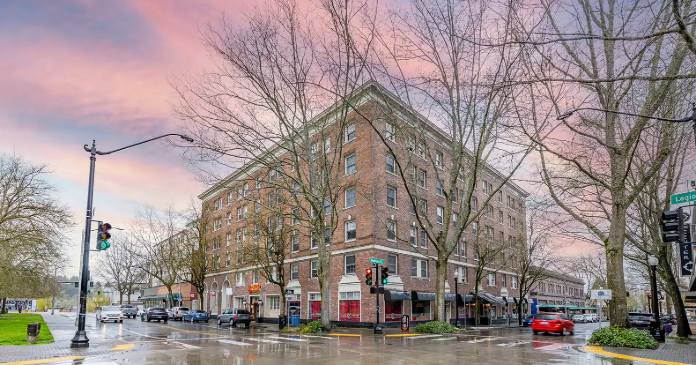Louis “Louie” Dubin is president and CEO
of The Athena Group, a privately-held real
estate investment company he founded in 1993. The Taubman family (patriarch A. Alfred Taubman, founder of the Taubman Centers) has been an active investor in Athena since its inception; his son, Robert, is a board member.
Based in New York City, the firm has an impressive portfolio with some fairly dazzling for sale condominium products hitting the market in the greater Washington, D.C. and New York areas in the next months, as well as Rhode Island, Los Angeles and Las Vegas. Louie has been busy.
And to think, he gave up teaching tennis for this. At least that’s what he’d be doing if he weren’t following the family legacy into real estate, or putting to use his JD from Washington College of Law at American University.
Dubin is a fourth-generation developer, but that’s just the beginning of a story of passion for making a mark on the world.
“My great grandfather, granddad, my father, were all developers,” says Dubin.
“I’ve been immersed in the business since I was a kid. I’ve always felt comfortable in it.”
Dubin’s undergraduate degree is from Washington and Lee University. Directly out of law school, he went to work for his family’s development firm, The Dubin Companies, as principal and general counsel. There he developed single-family, highrise condominiums and planned communities at an aggregate value of $100 million.
“I became a developer younger than most,” says Dubin. Whether it’s hard wired, or the fact that he lived with the business his whole life, he quickly acclimated to the high risk environment. “Taking on the daunting risks of running a development company was comfortable,” he says.
NATHAN AND HARRY D. MYERBERG
Generations before, Dubin’s great-grandfather
was a major housing developer in Baltimore founding N.J. Myerberg and Sons. Probably his greatest claim to fame was his trade skill as one of the nation’s first electrical contractors. Nathan helped to electrify major cities across the mid- Atlantic and built many of the first dual (gas and electric) buildings through the country’s precarious transition to electricity.
Louie’s grandfather, Harry D. Myerberg, reluctantly followed in his father’s footsteps.
From Baltimore, Harry first followed his
brother to New York to work in the entertainment
industry and became manager of Warner Brothers’ theaters in northern New Jersey and New York City. It’s said that he considered moving to Los Angeles and joining 20th Century Fox, but changed his mind and returned to Baltimore to join the family building and development business which eventually came to be called Myerberg Brothers.
Over his seventy year career, Harry constructed
thousands of homes throughout Maryland and Florida: 4,000 garden apartments, 3,700 townhouses and 2,000 single family homes in the Baltimore-Annapolis area, 5,000 retirement apartments in Florida, and a number of strip shopping centers. During World War II, Harry worked with his brothers, Edward and Jay, to construct military housing at Fort Meade.
After the war, he met with former first lady Eleanor Roosevelt to discuss ways to racially integrate construction work sites.
“He had success on some of his sites, and on some he did not. It was a time of segregated America,” said his daughter Nancy Myerberg Zirkin of Chevy Chase, deputy director of the Leadership Conference on Civil Rights.
He also constructed low-income housing
and was an adviser to the federal government
when the Department of Housing and Urban
Development was established in the 1960s.
“He was a believer in providing housing
for low- and moderate-income people,” said
Zirkin, who called her father an “enthusiastic
advocate for civil rights.”
RICHARD & ELIZABETH DUBIN
Harry’s son-in-law and Louie’s father and first employer out of law school, Dick Dubin, also became a developer forming Dubin Builders Company in Bethesda, Maryland. The company’s portfolio includes both commercial and residential. Dick Dubin developed over 7,000 multifamily units spanning 3,000 rental and 4,000 for sale over the
course of his career. Most of these were in
the Baltimore-Washington area and in various
partnerships, though primarily with the National Housing Partnership (NHP) under Warren Buffet’s ownership.
Probably most notable is Dick and Elizabeth’s status as the definitive Washington power couple, as they will be found on the A-list of every event on the Washington scene from the National Symphony Orchestra Ball to the elite Washington’s Social List. Louie’s mother Elizabeth Myerberg Dubin was appointed by President Bush as a member of the President’s Committee on the Arts and the Humanities. Elizabeth and Dick Dubin run a number of foundations and grants, and are extremely involved on the political scene, somehow finding a way to partner even with differing party memberships.
A CHIP OFF THE OLD BLOCKS
It’s clear that Louie is a product of his family’s ideals and values. After working for his father, he went on to work as director of the National Land Fund for The Resolution Trust Corporation where he created and directed the $1.7 billion National Land Fund. Louie says, “In the early 90s, I went to work for the RTC. I was a federal official running clean up for all the non-performing land in the United States.”
This disposition program was the RTC’s first limited partnership between the private sector and government. It was notably an impressive accomplishment as Institutional Investor magazine awarded it their coveted “1993 Real Estate Deal of the Year.”
“It was remarkable,” says Louie. “No government
employee had ever won that award. And the experience made me familiar with high finance, as well as the structure of very large real estate deals.”
THE ATHENA GROUP
Today, Louie’s directive is to build to a wide
open market segment looking for mid-level
priced product. “My focus is to provide housing
that is of value,” he stresses. “There’s a
lot of product built over the last few years
that is moving toward a higher and higher
price point; it’s becoming unattainable for
most people.” Louie believes there is a large
segment of mid-range buyers looking for value-priced housing that still offers the fit
and finish of a more expensive product. “We
continually look for opportunities to provide
value to homeowners and investors,” Louie says. “In fact, we’re building more median priced product than higher end.”
“Most companies have not focused on the mid-market and we’ve found it to be a great niche. There are more people in that market than any other,” states Louie. “They’ve anxiously waited for more affordable housing opportunities to make their purchase; we provide that opportunity.”
When it comes to the hottest markets for mid-level priced product, Louie is squarely fixed on Washington D.C., New York City and the New Jersey waterfront, yet the company is stretching outward.
“One of our newest products is in Providence, Rhode Island,” he says. “It’s called ‘The 903,’ and it’s priced at almost $200 a foot less than the nearest competitor; we’re about $350 a foot and the nearest competitor is $550 a foot. It’s a great value for the consumer.” He continues, “Many can’t afford the $550 product, so we’ve stepped in to provide a lower-tiered product that is typically unavailable in this market.”
The Athena Group is continuing to expand in a number of new markets with the mid-level price concept. Louie confides, “We’ll announce two new products in Los Angeles in the next month.”
Athena recently announced a project in Las Vegas aimed at long-needed workforce housing for casino and defense workers. The company is in the planning stages on additional million feet of retail in Vegas, as well.
Targeting the mid-level home buying market reflects Athena’s corporate vision and long-range goals. “It speaks to growth and diversification,” states Louie. “We’re now on both coasts in most of major growth markets. Today we have about 4,500 housing units in production and our goal over the next five years is to double that. We are in a growth mode.”
Says Louie, “Because we’re on the sales side
of the business, it isn’t necessarily cash flow
oriented; it’s total dollars and total return oriented. We’re a little more patient than the multifamily rental view of the market.”
“Florida’ is the question begging to be asked
when one thinks of condos. The market has exploded, and many wonder what the tried and true condo builders think of the bloated market conditions.
“We’re still in the South Florida market on
the resale side. We have a brokerage company
there,” says Louis. “We’re really waiting
for the froth to burn off before we re-enter
there.” As to the condo rage in play, Louie
agrees: “There’s a tremendous disequilibrium
between supply and demand. In some cases a bubble condition exists, in other locations, it’s a resetting of price.”
MATCHING MARKET TO PRODUCT
Athena relies on a sophisticated, by the numbers, methodology of selecting markets ripe for development.
“Ken Rosen of Rosen Consulting out of San Francisco does the macroeconomic forecast for us in terms of job growth and household formation in key cities in the U.S.,” confides Louie. “We closely monitor job growth and long term population trends. We’re keen on markets where peoplem are working and the population is growing. We’re in half a dozen of the top ten job growth markets — that’s job growth both on a percentage and on an absolute basis. We then have our acquisitions people focus on those markets
where we think the median and long term prospects provide the best opportunity.” Once the property is acquired, Louie’s brother, Harry, runs the national sales and marketing for Athena. Harry makes certain product amenities and packaging line up with the market demographics.
BUILDING THE BEST
When hiring and recruiting talent, Louie looks to education, then proven performance. Partial to the top east coast programs, the company relies heavily on the Masters in real estate candidates to deliver the vision to the buyer.
“We recruit MBAs,” says Louie. “We look for well rounded individuals with both financial and other esoteric skills.” Louie sees the most successful development company lined with people who are tactile with numbers, as well as with concepts and form. Focusing on the numbers is only part of the equation. He makes a point of teaching the younger people in the company the full breadth of development from planning, design, sales and marketing, construction to construction management, even if they have nothing to do with those functions. Louie says, “It fuels their growth if they’re exposed to all the disciplines early on.”
The company provides just such exposure at the all-hands development meetings. These weekly meetings include twenty professionals from different organizational levels, discussing what’s going on with various projects, and has become a forum for teaching the younger people the business.
HOW IS ATHENA DIFFERENT?
One of significant differences that sets Athena apart from other developers is its proprietary fund. The fund is typically raised by one of the big investment banks: Morgan Stanley put together Athena’s first fund four years ago. UBS did a follow up fund only months ago.
It provides Athena a large pot of proprietary
capital in a blind pool. Louis states, “We can select any project we’d like to do. That pool of money allows us to do 12-15 new projects every 3 years. We have the proprietary capital in hand, ready to go.”
For large deals, Athena will solicit partners,
but continues to hold an advantage over private developers who must seek out capital. The fact that Athena is privately held allows it to be more nimble than public companies with more restraints and many more issues. Louie says, “We’re in this kind of nether land where we have the capitalization of a public company and the nimbleness of a private company. Private developers lack the proprietary capital.”
He continues, “We’ve been plus-30% annual return on investment equity since 1993 domestically. It’s one of the reasons we’re one of the only private development funds. Our track record speaks for itself. People at institutions are very comfortable investing with us. I have a lot of my money in it, too.”
WAR GAMER STRATEGIES
Like the multi-faceted Dubin that he is,
Louie also happens to be one of the world’s
most ardent collectors of miniature warrior
figures. He’s known as a “war gamer.” Add
Louie to the list of other notable collectors:
Malcolm Forbes, Winston Churchill, Robert Louis Stevenson. His 5,000-piece army fight their eternally-poised battles in plexiglass-encased dioramas in his Fifth Avenue office. Dubin’s toy soldiers consist of W. Britain, Heyde and Mignot figures (the top three firms in lead, hollow-cast soldier manufacturing).
When asked about what notable battle strategies might inspire him in running his firm, Louie is quick to respond. “Never fight a battle on two fronts. If you have two big issues going, boil it down to one and deal with the other one later. What happened when Napoleon fought on two fronts? He lost.”















